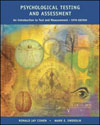 |  Psychological Testing and Assessment: An Introduction To Tests and Measurement, 5/e Ronald Jay Cohen
Mark Swerdlik
Preschool and Educational Assessment
| Achievement test | Evaluation of accomplishment or the degree of learning that has taken place, usually with regard to an academic area, 294-299
|  |  |  | | Aptitude test | A test that usually focuses more on informal as opposed to formal learning experiences and is designed to measure both learning and inborn potential for the purpose of making predictions about the testtaker's future performance; also referred to as a prognostic test and, especially with young children, a readiness test, 300-306, 509-515
|  |  |  | | At risk | Defined in different ways by different school districts, but in general, a reference to functioning that is deficient and possibly in need of intervention, 290-291, 480
|  |  |  | | Authentic assessment | Also known as performance-based assessment, evaluation on relevant, meaningful tasks that may be conducted to examine learning of academic subject matter but that demonstrates the student's transfer of that study to real-world activities, 319
|  |  |  | | Checklist | A questionnaire formatted to allow a person to mark items indicative of information such as the presence or absence of a specified behavior, thought, event, or circumstance, 289
|  |  |  | | Curriculum-based assessment (CBA) | A general term referring to school-based evaluations that clearly and faithfully reflect what is being taught, 299
|  |  |  | | Curriculum-based measurement | A type of curriculum-based assessment characterized by the use of standardized measurement procedures to derive local norms to be used in the evaluation of student performance on curriculum-based tasks, 299
|  |  |  | | Diagnostic information | In educational contexts, test or other data used to pinpoint a student's difficulties for the purpose of remediating them, 306
|  |  |  | | Evaluative information | Test or other data used to make judgments such as class placement, pass/fail, and admit/reject decisions; contrast with diagnostic information, 306
|  |  |  | | Learning disability | A disorder involving a discrepancy between ability and achievement, which may manifest itself in attentional, emotional, perceptual, and/or motor deficits, and/or in problems related to doing mathematical calculations, reading, writing, spelling, or using or understanding spoken or written language; not applicable to persons who have academic problems that are cultural or economic in origin, or to persons who have learning problems arising primarily from visual, hearing, or motor handicaps or mental retardation, 294-295
|  |  |  | | Locator test | A pretest or routing test, usually for determining the most appropriate level of test, 295
|  |  |  | | Peer appraisal | A method of obtaining evaluation-related information about an individual by polling that individual's friends, classmates, work colleagues, or other peers, 319-320, 527-528
|  |  |  | | Performance assessment | An evaluation of performance tasks according to criteria developed by experts from the domain of study tapped by those tasks, 318
|  |  |  | | Performance task or test | (1) In general, a work sample designed to elicit representative knowledge, skills, and values from a particular domain of study; (2) in employment settings, an instrument or procedure that requires the assessee to demonstrate certain job-related skills or abilities under conditions identical or analogous to conditions on the job, 318
|  |  |  | | Prognostic test | A tool of assessment used to predict; sometimes synonymous with aptitude test, 300-306.
|  |  |  | | Psychoeducational test battery | A packaged kit containing tests that measure educational achievement and abilities related to academic success, 308-317
|  |  |  | | Rating scale | A system of ordered numerical or verbal descriptors on which judgments about the presence/absence or magnitude of a particular trait, attitude, emotion, or other variable are indicated by raters, judges, or examiners or, when the rating scale reflects self-report, the assessee, 181, 194-196
|  |  |  | | Readiness test | A tool of assessment designed to evaluate whether an individual has the requisites to begin a program or perform a task; sometimes synonymous with aptitude test, 301
|  |  |  | | Screening tool | (1) An instrument or procedure used to identify a particular trait or constellation of traits at a gross or imprecise level, as opposed to a test of greater precision used for more definitive diagnosis or evaluation; (2) in preschool assessment, an instrument or procedure used as a first step in identifying a child who is "at risk" or not functioning within normal limits; (3) in employment settings, an instrument or procedure used as a gross measure to determine who meets minimum requirements set by the employer, 289-290
|  |  |  | | Sociogram | A graphic representation of peer appraisal data or other interpersonal information, 320
|
|



 2002 McGraw-Hill Higher Education
2002 McGraw-Hill Higher Education